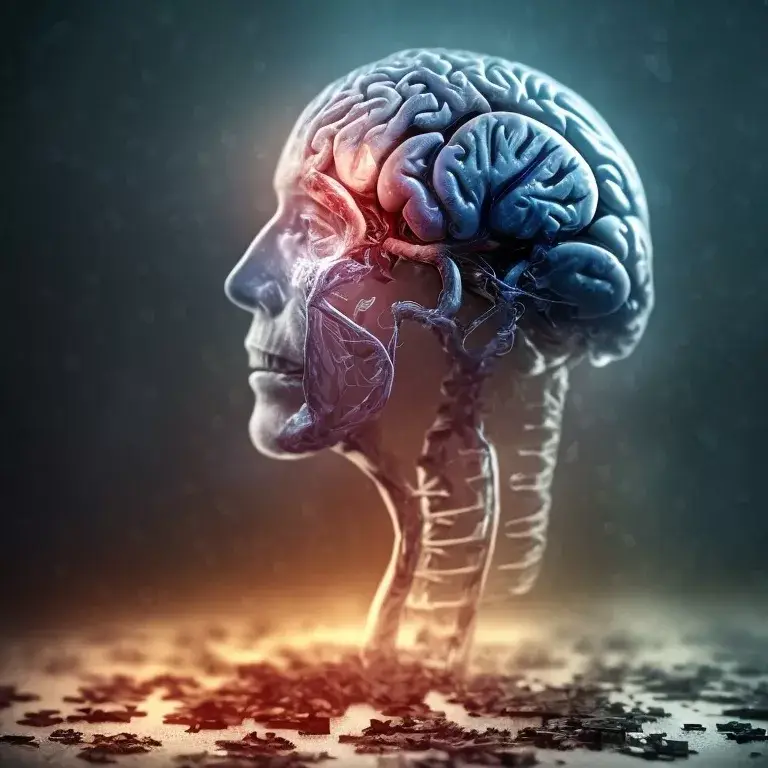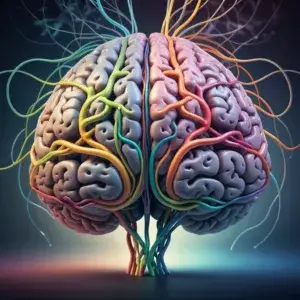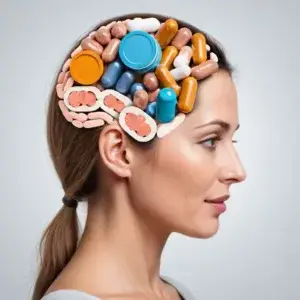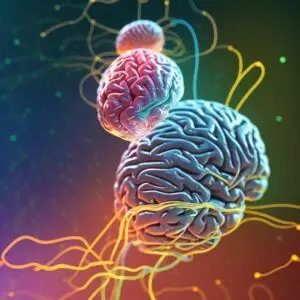Table of Contents
How do you reverse cognitive decline? How do you maintain your brain health? The questions are fundamental to our overall well-being, affecting everything from decision-making and emotional regulation to physical health and longevity. Unfortunately, various lifestyle factors can negatively impact brain function, leading to cognitive decline. This article will guide you through six essential steps to optimize brain health and reverse cognitive decline.
6 Steps to Reverse Cognitive Decline
Step 1: Optimize Your Diet
Impact of Diet on Brain Health
Your diet profoundly affects your brain health. Certain foods can significantly harm brain function:
- Sugar: Highly inflammatory, addictive, and increases erratic brain cell firing.
- Simple Carbohydrates: Create addiction and contribute to poor mental health.
- Alcohol and Simple Carbohydrates: Affect serotonin and the frontal lobes, leading to increased food intake.
- Low-fat Diets: Harmful since the brain is 60% fat and requires healthy fats for optimal function.
- High Fasting Blood Sugar Levels: Can cause brain atrophy and brittle blood vessels, leading to a condition known as “diabesity,” which harms brain function.
Conversely, some foods support brain health:
- Healthy Fats: Found in salmon and avocados, these are essential for brain health.
- Colourful, Clean Fruits and Vegetables: Beneficial for overall brain function.
Healthy Eating Strategies
To optimize your diet for brain health:
- Avoid Alcohol and Bread: Declining these at restaurants can prevent overordering and consumption of unhealthy desserts.
- Incorporate Essential Supplements: Omega-3 fatty acids and vitamin D are critical for brain health.
- Use Elimination Diets: Identify and remove harmful food triggers.
- Prioritize Healthy Foods: Avoid highly processed, pesticide-sprayed, high glycaemic, low fibre, food-like substances.
Step 2: Incorporate Regular Exercise
Benefits of Exercise on Brain Health
Exercise is crucial for maintaining brain health. It helps drive beneficial tryptophan into the brain, reducing depression and enhancing mood. Coordination exercises, such as racquet sports or ballroom dancing, stimulate the cerebellum, a key area for cognitive processing and emotional regulation.
Recommended Exercises
- Coordination Exercises: Racquet sports and ballroom dancing are excellent choices.
- Regular Physical Activity: Establishing a consistent exercise routine is foundational for brain health.
Step 3: Manage Stress Effectively
Techniques for Stress Management
Chronic stress negatively impacts brain health. Effective stress management techniques include:
- Diaphragmatic Breathing: Triggers a parasympathetic response, calming the mind.
- Warmth: Holding something warm or using warm water can induce relaxation.
- Hypnosis and Neurofeedback: These tools help manage stress by training the brain.
- Hyperbaric Oxygen Therapy: Improves blood flow and brain health.
Relaxation Practices
- Diaphragmatic Breathing: Breathe deeply and exhale slowly to activate the relaxation response.
- Using Warmth: Warm water or warm objects can help calm the nervous system.
Step 4: Address Mental Health Issues Holistically
Mental Health and Brain Health Connection
Mental health issues often stem from brain health problems. Addressing these issues holistically can reduce mental health problems and improve overall well-being.
Techniques for Mental Health Improvement
- EMDR and Havening: These techniques help process and reduce the impact of trauma.
- Journaling and Challenging Negative Thoughts: Helps reframe thinking and promote accurate thinking.
- Identifying Dragons: Recognize and manage dragons such as anxiety, responsibility, woundedness, inferiority, and fear of death.
Step 5: Form Healthy Habits and Break Bad Ones
Habit Formation and Brain Health
The brain forms habits through repeated behaviours. Bad habits can become ingrained, but they can be broken with effort and consistency.
Strategies for Breaking Bad Habits
- Decline Unhealthy Foods: Say no to alcohol and bread at restaurants to reduce overordering and unhealthy consumption.
- Accurate Thinking: Focus on accurate thinking rather than overly positive or negative thoughts.
- Integrate Emotional Management: Combine accurate thinking with strategies to manage emotions.
Step 6: Set Clear Goals and Align Behaviors
Importance of Goals
Setting clear goals is essential for guiding behavior and maintaining a balanced life. Goals help align daily actions with long-term objectives.
Practical Steps for Goal Setting
- Establish Clear Personal Goals: These enhance mental and physical health.
- Align Behaviours with Goals: Ensure that daily actions support long-term objectives.
- Regularly Review and Update Goals: Stay on track by revisiting and adjusting goals as needed.
Prioritizing brain health through these six essential steps can significantly improve cognitive function, mental health, and overall quality of life. By optimizing your diet, incorporating regular exercise, managing stress effectively, addressing mental health holistically, forming healthy habits, and setting clear goals, you can boost brain health and reverse cognitive decline. Embrace these strategies to enhance your brain health and enjoy a better quality of life.








This article does a fantastic job of breaking down the essentials for maintaining and even improving brain health. I appreciate how it connects each lifestyle choice, like diet and exercise, directly to cognitive function. The emphasis on healthy fats and colorful veggies in our diets really resonates with me simple changes that can have a big impact!
Overall, these steps seem practical and actionable, making the path to better brain health feel less overwhelming. I’m definitely going to revisit my goals with these insights in mind. Thanks for sharing such valuable advice!
Hi Kavitha yes you are right that the path to better brain health and overall health does not have to be overwhelming. I like to use strategies like habit stacking and starting with small steps to incorporate these things into my daily routine. Initially the differences might not be that great but over time they can definitely make a big difference. The old saying is ‘a journey of 1000 miles starts with a single step’.
Wow, there is so much great information here, I appreciate your vast knowledge which I will strive to incorporate into my life habits. I think it’s important in modern-day life to eat a fresh healthy diet instead of takeaways and processed food. Do you like the new labeling systems that have been introduced? (depends on which country)
I think it may not be easy to know what food has been treated with pesticides and other chemicals unless you know how to confidently identify pesticide-treated foods. I find it difficult to do many exercises other than lots of walking, any other exercise is problematic for me due to health reasons, so your article gives me hope to keep a healthy mind as I have been rather lazy with my diet and have been making a huge effort to change it.
Your website will be visited by me a lot more as I found the information to be insightful which will be useful in changing my life choices, thank you very much.
Hi Robbie thanks for stopping by and I appreciate your comment. Walking is a great physical activity and if that is all that you can do, then do that. There is an old saying that you can;t outrun (or outwalk) a bad diet so I would definitely offer encouragement in terms of improving your diet, choosing more healthy items, and reducing your choices of unhealthy items. Every little bit helps.
Your article provides vital information on how we can take care of our brains by following a healthy lifestyle. An unhealthy diet affects not only the body but also our brain. It seems by avoiding unhealthy foods, we take care of our bodies as well as our brain health. Exercise remains pivotal for our body fitness and also the brain, you have specified the type of exercise beneficial for the brain, which is crucial if our physical activities are to impact the brain health. In our fast-paced lives, stress can negatively impact our mental well-being.
The suggestions you have identified like breathing techniques and warmth are both easy to adopt and practical. Indeed a holistic approach to mental health is an integral part of mental health wellness as the physical, mental, emotional and societal aspects of our being all play a role in achieving optimum health. Thank you for sharing these vital insights that have a bearing on our brain health.
Hi Tandi1 thanks for stopping by. Brain health and mental health definitely require an integrated approach by including activities to help with our physical, mental and emotional health. As you rightly identified as well the social component and our engagement with our communities also plays a part in our overall wellbeing and our brain health as well